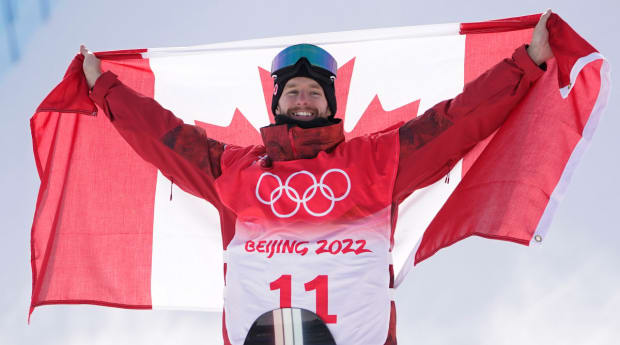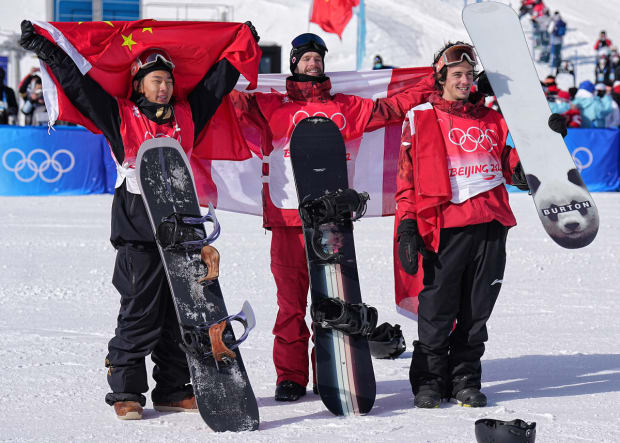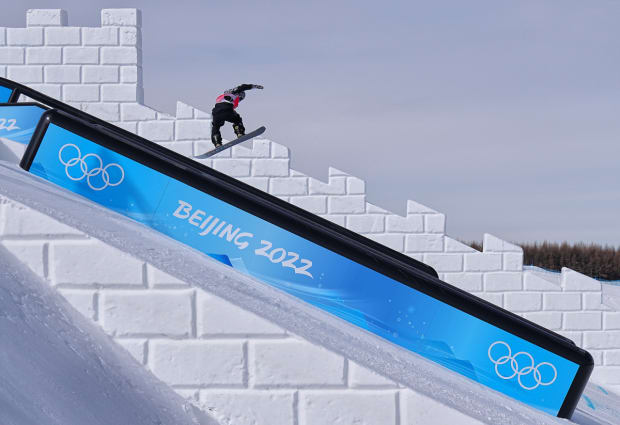Three years after his diagnosis and a dozen chemotherapy treatments, the 27-year-old nailed the biggest run of his career on a one-of-a-kind course to top the podium.
ZHANGJIAKOU, China — Down the line of media the champion went, camera after camera, gaggle after gaggle, a fat grin on his face and a thin maple leaf flag draped over his shoulders. At each stop, with seemingly every answer, Max Parrot punctuated his words by spreading his arms and raising his palms and gesturing around the scene here at Genting Snow Park, as if to tell his audience, Look at all this. Can you believe it?
Well, can you? Three years ago, the Canadian slopestyle snowboarder was sprawled across a hospital bed in Granby, Que., one of a dozen chemotherapy treatments in six months’ time pumping into his ravaged body to fight his Hodgkin's lymphoma diagnosis. “I had no more muscles, no more energy, no more cardio,” Parrot, now 27, said. “I almost wanted to quit sometimes because it was getting too hard just to get to the next morning. And to be standing here winning gold, that is completely crazy.”

Jack Gruber/USA TODAY Sports
Yet it also makes perfect sense. After receiving the cancer-free all-clear in 2019, Parrot not only battled back from the brink but aced what he described as “the hardest run I’ve ever done in my career,” landing three straight triple corks on his second of three finals tries on Monday afternoon to hold off China’s Su Yiming (silver), Canadian teammate Mark McMorris (bronze) and a three-man U.S. contingent led by reigning Olympic champion Red Gerard (fourth).
“It could’ve went wrong easily, and I was able to stay focused and lay down every feature to perfection, which got me to [90.96 points, according to the judges] and the gold medal I was missing in my library,” Parrot said. “So I’m really proud of that as well.” Everyone else was too. “A guy who’s been through so much and continued to work hard and keep going at it is insane,” Gerard said. “I don’t know if he's my first pick—I’d want USA to win—but he's in my top three for someone to win.” Added McMorris, “He's been through a lot. Just like myself.”

Erick W. Rasco/Sports Illustrated
Indeed, Parrot wasn’t the only rider to overcome adversity on his way to the podium on this one-of-a-kind course, with its respective trios of jib and jump sections; a snow barrier built to resemble the Great Wall of China; and a fake watch tower dubbed the “shred shed.” In May 2017, a year and a half before Parrot’s cancer diagnosis, McMorris was filming in the backcountry of British Columbia when he went off a jump and crashed into some trees, suffering a broken jaw, a collapsed lung and a pelvic fracture, among other horrific injuries. McMorris nearly died but nonetheless returned in time for the PyeongChang games, placing third in slopestyle behind Gerard and Parrot. “I’ve definitely got a lot of titanium [in me],” he said Monday.
Rounding out the top three was local hero Su, whose medal—the first for a Chinese man in snowboarding—drew a “Riders of Rohan”-style phalanx of volunteers across the top of the final jump to watch the medal ceremony. Just 17, Su grew up idolizing McMorris, a regular on snowboarding goodwill missions to China who recalled seeing “this kid always around … Then, boom,” McMorris said. “This fall he’s so damn good.” Sometimes, McMorris said, he will even notice a trick of Su’s and think, "You grabbed that from my book!”

All of which left the U.S. shut out from the top three, with Chris Corning finishing sixth and Sean Fitzsimons at 12th, last among the finalists. Gerard had the best shot, holding the lead after the first round of finals runs with an 83.25, but never improved on his score. “Fourth never feels good, you know?” the 21-year-old lamented. “One off from being cool.” It is a distinct contrast from the attitude that the baby-faced Gerard displayed in PyeongChang, where he rode free of pressure—or even much knowledge about the importance of the Olympics.
“I’m just really happy that I landed a run, probably the best run I’ve ever done,” Gerard eventually concluded. “Just taking the good out of it … When I was a kid, I used to be so happy with [fourth place]. The expectations just get a little higher.”
For Parrot, on the other hand, outside expectations for Monday were finish-line low after he came out of qualifying in 10th, sandwiched between Norway’s Mons Røisland and Corning. But he woke up that morning and mapped out his ideal trick sequence, capped off by the triple corks. “In the qualis I really just wanted to go for a safe run to make the finals, and that worked out,” Parrot said. “I was going to go big or go home today.”
He went big. Now the man who has been through hell and back will go home with gold.
More Winter Olympics Coverage:
• Even in Defeat, Mikaela Shiffrin Shows Her Star Appeal
• Maame Biney’s Alter Ego Gives Her a Competitive Edge
• Polish Luger Overcomes Gruesome Injury to Compete at Olympics